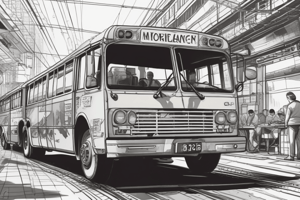Podcast
Questions and Answers
What is the concept that countries use to trade goods with each other?
What is the concept that countries use to trade goods with each other?
- GDP
- Opportunity Cost
- Supply and Demand
- Comparative Advantage (correct)
What does an exchange rate determine?
What does an exchange rate determine?
- The value of one country's currency compared to another's (correct)
- The price of goods within a country
- The GDP of a country
- The unemployment rate of a country
What happens to the price of apples if there's a big harvest and the supply increases?
What happens to the price of apples if there's a big harvest and the supply increases?
- The price of apples will increase
- The price of apples will decrease (correct)
- The price of apples will stay the same
- The price of apples will fluctuate randomly
What is the opportunity cost of buying a video game?
What is the opportunity cost of buying a video game?
What happens to prices if the inflation rate is 2%?
What happens to prices if the inflation rate is 2%?
What is the total value of all goods and services produced in a country?
What is the total value of all goods and services produced in a country?
What is the fundamental problem that leads to opportunity cost?
What is the fundamental problem that leads to opportunity cost?
What happens to the demand for a product when its price decreases?
What happens to the demand for a product when its price decreases?
What does the price elasticity of demand measure?
What does the price elasticity of demand measure?
Which market structure is characterized by a single business controlling the market?
Which market structure is characterized by a single business controlling the market?
What is the term for the total value of all goods and services produced in a country?
What is the term for the total value of all goods and services produced in a country?
What is the primary goal of monetary policy?
What is the primary goal of monetary policy?
What is the term for an increase in a country's production and wealth over time?
What is the term for an increase in a country's production and wealth over time?
What is the term for the study of how individuals make decisions to spend their money?
What is the term for the study of how individuals make decisions to spend their money?
Flashcards are hidden until you start studying
Study Notes
Basic Concepts
- Scarcity refers to the limited availability of resources (e.g., money, time, materials) and unlimited wants, forcing individuals to make choices.
- Opportunity Cost is the value of the next best alternative that is given up when a choice is made.
Supply and Demand
- Demand refers to the quantity of a product that consumers are willing to buy at different prices, typically increasing when prices drop.
- Supply refers to the quantity of a product that businesses are willing to sell at different prices, typically increasing when prices rise.
- Equilibrium is the point at which the quantity demanded equals the quantity supplied, resulting in a stable market price.
Elasticity
- Price Elasticity of Demand measures the responsiveness of demand to changes in price, with high elasticity indicating a significant change in demand in response to a small price change.
Microeconomics
- Consumer Behavior studies how individuals make spending decisions.
- Production and Costs involves businesses minimizing costs to maximize profits, considering both short-term (variable costs) and long-term (fixed costs) factors.
- Market Structures include:
- Perfect Competition: many firms selling identical products
- Monopoly: one firm controlling the market
- Oligopoly: a few firms dominating the market
- Monopolistic Competition: many firms selling similar but not identical products
Macroeconomics
- National Income (GDP) is the total value of all goods and services produced in a country, measuring economic health.
- Unemployment refers to individuals who want to work but cannot find jobs, with high unemployment negatively affecting the economy.
- Inflation is a sustained increase in prices over time, with moderate inflation being normal but high inflation being problematic.
- Economic Growth is an increase in a country's production and wealth over time.
Policies
- Monetary Policy involves central banks managing the money supply and interest rates to control inflation and stabilize the economy.
- Fiscal Policy involves government spending and taxation to influence the economy, such as cutting taxes to increase spending.
International Economics
- Trade involves countries exchanging goods based on comparative advantage, where each country produces what it's best at.
- Exchange Rates affect trade by changing the cost of goods from different countries, as the value of one country's currency is compared to another's.
Studying That Suits You
Use AI to generate personalized quizzes and flashcards to suit your learning preferences.




